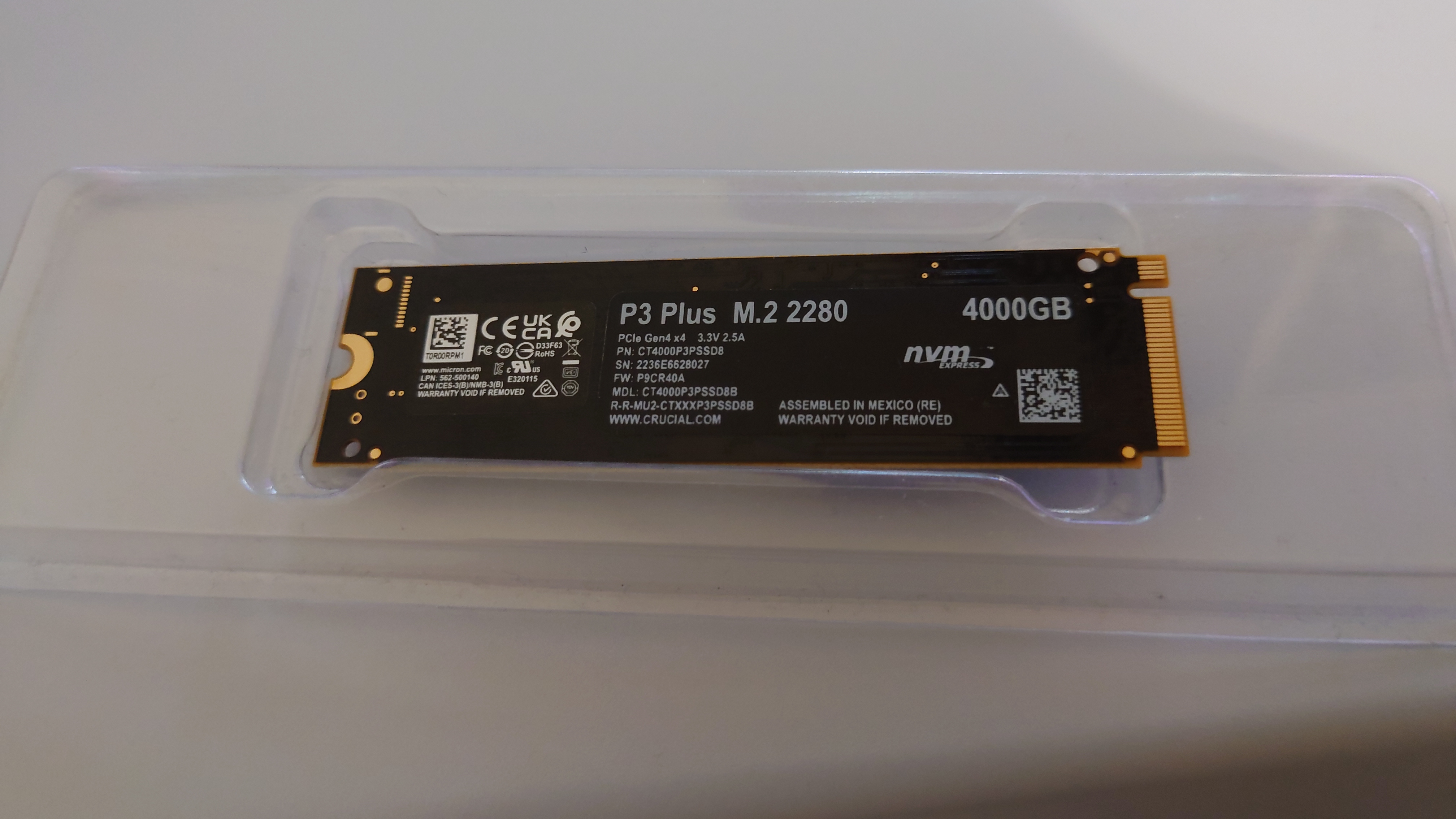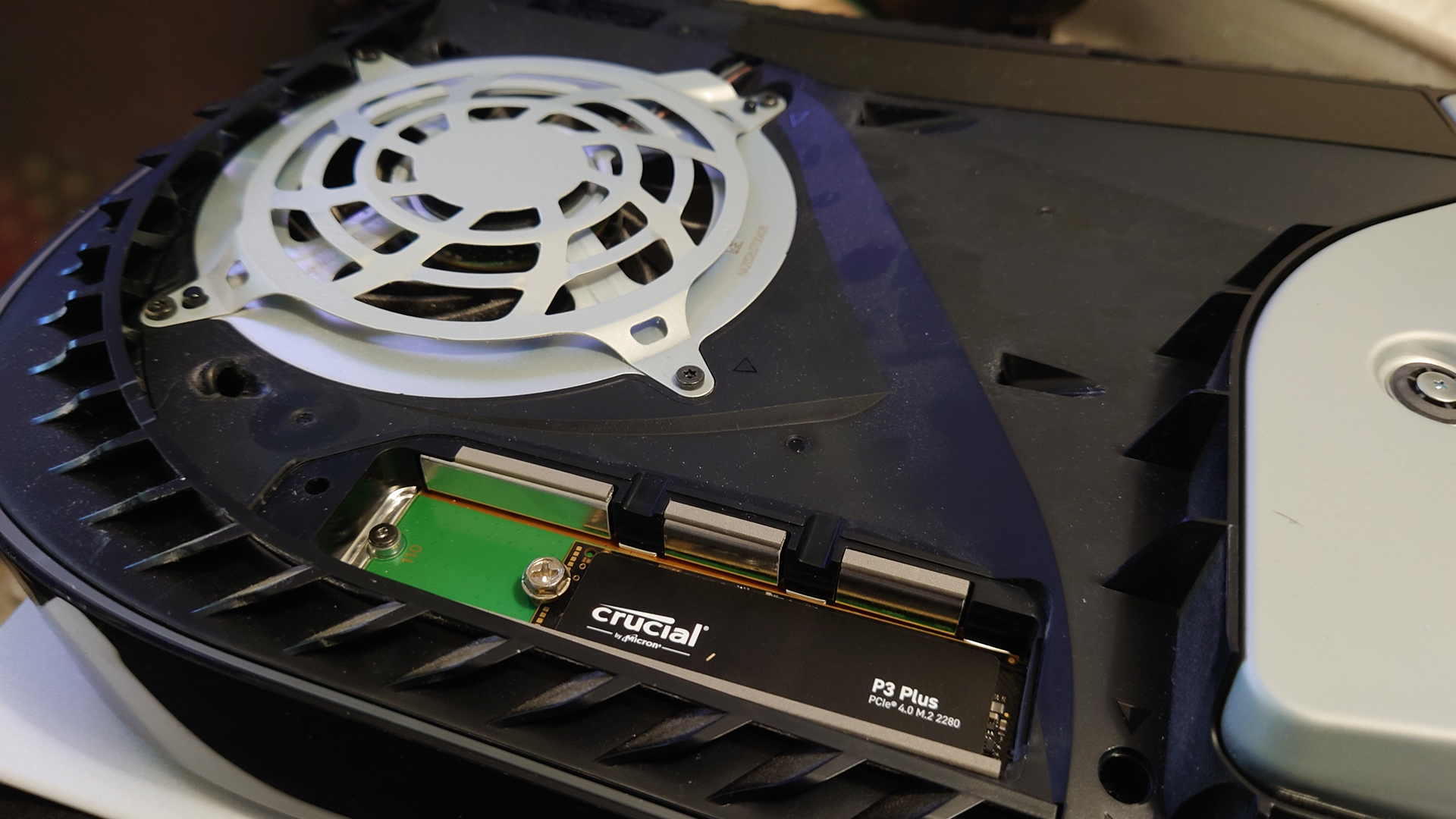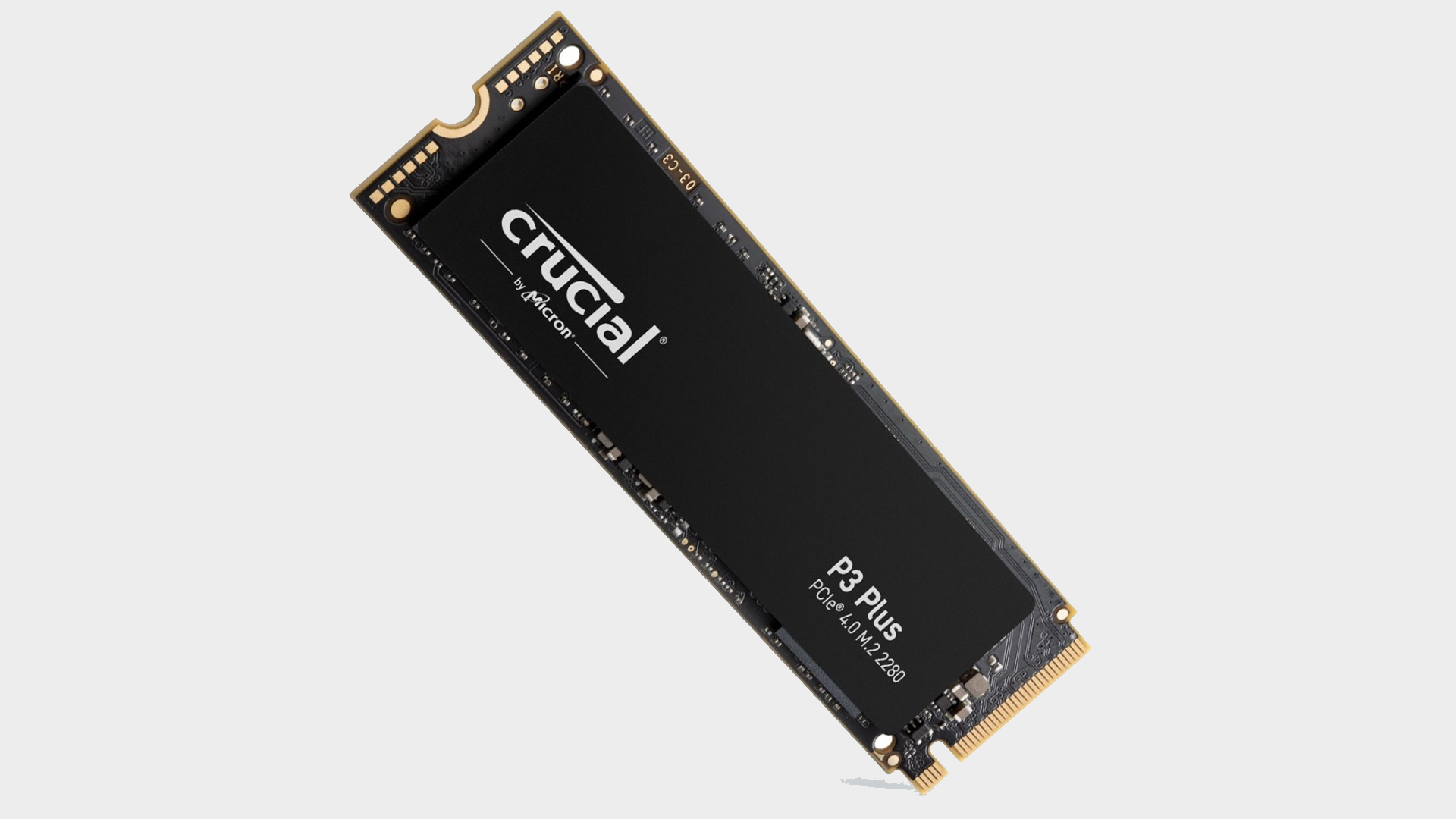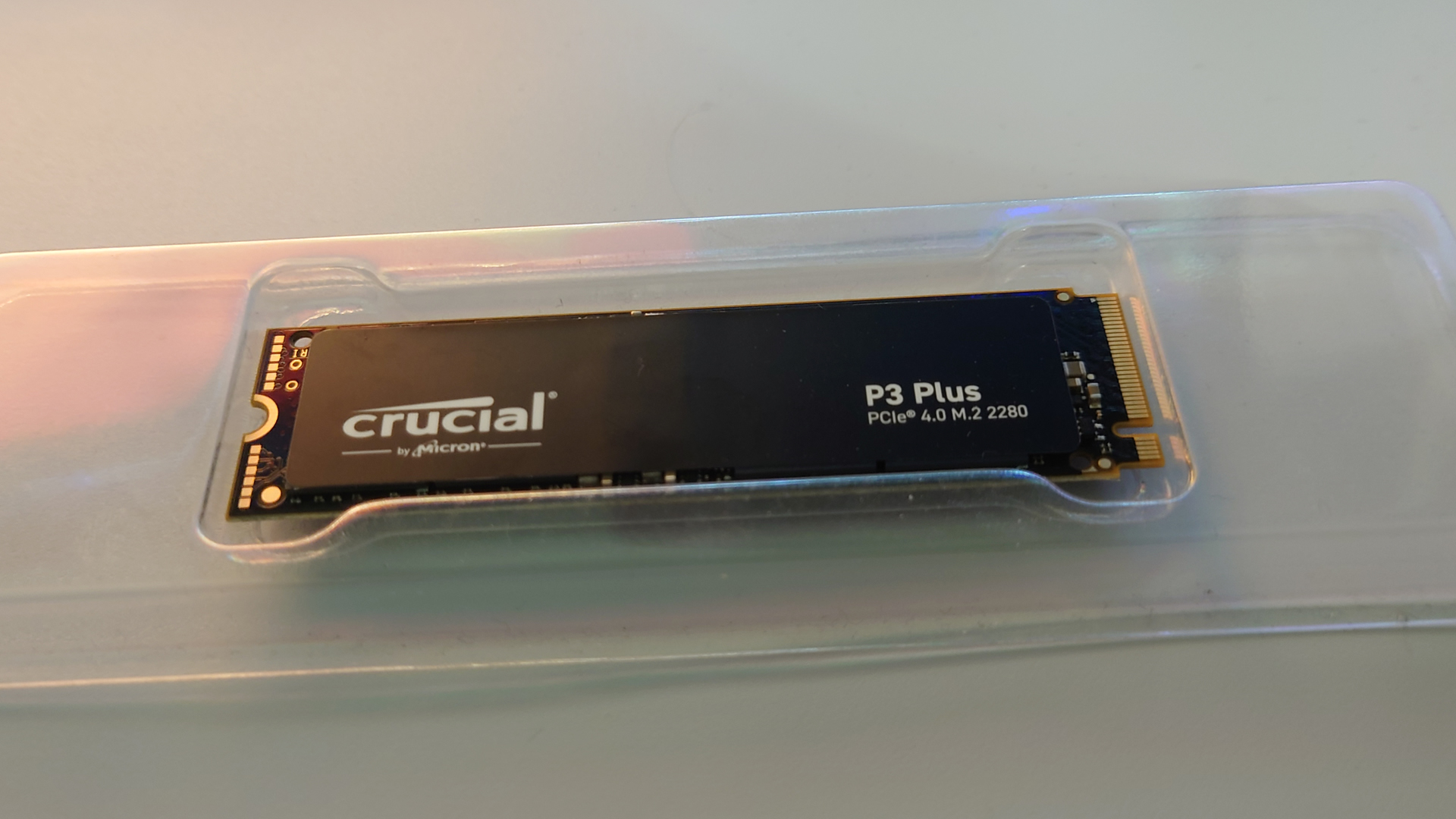GamesRadar+ Verdict
The Crucial P3 Plus 4TB is a decent performing Gen 4.0 NVMe SSD which holds its own where it matters most, even if it doesn't exactly set the world on fire in the process.
Pros
- +
Respectable sequential performance
- +
Competitively priced
- +
5-year warranty
Cons
- -
Replaced by the P5 Plus
- -
Average write endurance
Why you can trust GamesRadar+
The Crucial P3 Plus 4TB is an excellent value for money with its DRAM-less design and respectable Gen 4.0 sequential performance. Despite not being the fastest or most exciting storage drive on the market, there's certainly the argument that it can be considered one of the best SSDs for gaming.
With that said, the Crucial P3 Plus falls short of being an excellent all-rounder able to pull double duty as one of the best PS5 SSDs, too. This is down to the rates not quite matching that of Sony's hardware requirements despite its best efforts. Still, with its competitive asking price of $399 for a 4TB model, there's a lot of bang for your buck here that's worth acknowledging.
This drive is also available in 500GB configuration ($59.99), 1TB ($99.99), and 2TB ($189.99) for those who don't need quite as much overhead.
Design and Features
There's nothing particularly special about how the Crucial P3 Plus looks, for all that it matters. Things aesthetically are kept bare bones and straightforward with a sticker covering the Phison E21T controller and 176-Layer Micron QLC flash memory board. All you have to go on is the company's logo and the name of the drive itself, as well as its form factor; no-frills to a tee.
The build quality of the Crucial P3 Plus is far above how your typical wallet-friendly NVMe SSDs are, with a sturdy thickness to the board itself that isn't going to flex or bend on you. There's no heatsink included here, so you'll need to ensure that your motherboard's dedicated M.2 heat spreader or larger heatshield is applied.
As expected from a budget Gen 4.0 NVMe SSD, this particular model is DRAM-less, which is reflected in the overall performance that we'll touch on later. Lacking DRAM, though, means that this single-sided drive is low profile enough to fit into a suitable gaming laptop M.2 port as well as in your main gaming PC.

Performance
The performance of the Crucial P3 Plus 4B is certainly respectable on PC, with the brand's humble claims of up to 5000 MB/s read and 4200 MB/s write figures being right on the money in my testing. Speaking of, CrystalDiskMark reported figures of 5009.02 and 4332.15 read and write respectively, which actually goes slightly above the rates published.
This is also reflected in our AnvilPro test scores, too, with an overall figure of 18,961.54 taking into account its sequential and random performance on the whole. This is directly in the middle of where we find some other DRAM-less NVMe drives, such as the Patriot Viper VPR400 with its InnoGrit IG5220 controller. You won't be scrapping that 7000 MB/s Gen 4.0 cap here, but for gaming and file transfers, you could do far worse.
Real-world file transfer times give us a clearer indication of how capable the Crucial P3 Plus can be. Street Fighter V, with its 54GB file size, made the leap from another leading Gen 4.0 SSD in just 23 seconds for a transfer rate of 2.45GB/sec. This is consistent with Cyberpunk 2077, at a whopping 64GB, which transitioned between drives in only 27.7 seconds for 2.42GB/sec. Definitely respectable territory here.
In-game performance was noticeably nippy with our 4TB review unit powering through intense sessions of Destiny 2 at lightning speeds with no identifiable slowdown when compared to some other Gen 4.0 drives that I've used with this game. If you're after a drive that won't break the bank in your PC for higher capacities, you may be served well with the Crucial P3 Plus.

Although not advertised as a PS5 SSD, I also decided to see what the Crucial P3 Plus 4TB could do when hooked up to Sony's latest system. Coming in at just under the recommended minimum benchmarks for what the hardware manufacturer advises, the drive was recognized by my console and worked flawlessly in every game and file transfer test I threw at it.
To see what this DRAM-less SSD could do, I transferred a total of 88.89GB worth of data from my PS5's internal storage to the P3 Plus, and the results surprised me. Matrix Awakens, 25.27GB, was written onto the NVMe SSD in just 22 seconds, with Fortnite, and its larger 32.95GB file size, successfully installed in just 28 seconds; absolutely nothing wrong with the rates here.
Said games that made the transition performed as if they were installed natively on the console's internal drive with no differences being immediately apparent in the several hours I played. It should be said, should PS5 be a priority here, that you will have a better time opting for the Crucial P5 Plus instead which is tailor-made for the system. However, should you want to throw a P3 Plus into it, I can confirm that it does work well.

Should you buy the Crucial P3 Plus 4TB SSD?
The Crucial P3 Plus is a decent performing drive at a budget price, especially when higher capacities such as 2TB and 4TB are considered. It solidly offers excellent value formoney even if it is a bit unexciting.
However, there isn't much in the difference between the costs of this model, and its successor, the P5 Plus. Given the choice between the two, the latter wins out, but if you can find this one on sale, then it's more than worth a place in your PC's M.2 port.
How we tested the Crucial P3 Plus 4TB SSD
I used the Crucial P3 Plus 4TB as my main SSD for gaming and working over the past week or so. During this time, I used industry standard tools, CrystalDiskMark and AnvilPro alongside my own internal testing to ascertain the values of this Gen 4.0 drive. I also ensured it was put through its paces in the PS5's SSD bay, using it for game transfers and playing games directly from it.
You can find out more about how we test SSDs and hard drives in the full GamesRadar Hardware Policy.
If you need more storage but in the form of something more externally-shaped then check out our guides to the best external hard drives, best PS5 external hard drives, and best Xbox Series X external hard drives.

Aleksha McLoughlin served as the Hardware Editor for GamesRadar from June 2021 until August 2022. Her main area of expertise was the PC gaming platform, which comprised buying guides, features, reviews, and news coverage on components and prebuilt machines. She was also responsible for gaming chairs and storage. She now works on a freelance basis while studying to become a university lecturer specializing in English for foreign territories. Prior to joining GamesRadar, she wrote for the likes of Expert Reviews, The Rory Peck Trust, No Clean Singing, Vinyl Chapters, and Tech Spark while also working with the BBC.



